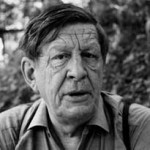A false enchantment can all too easily last a lifetime.
W. H. Auden Quotes
Without art, we should have no notion of the sacred; without science, we should always worship false gods.
Similar Quotes
Only a great actor finds the difficulties of the actor's art infinite.
- Ellen TerryArt is the objectification of feeling, and the subjectification of nature.
- Susanne LangerAny work of art that can be understood is the product of journalism.
- Tristan TzaraArt is subject to arbitrary fashion.
- Kary MullisRationalism is the enemy of art, though necessary as a basis for architecture.
- Arthur EricksonComments on: "W. H. Auden Quotes: Without art, we should have no notion of the sacred; without science, we..."

| Birth: | 21st February, 1907 |
| Death: | 29th September, 1973 |
| Nationality: | American |
| Profession: | Poet |
Auden was born in York, England, to George Augustus Auden, a physician, and Constance Rosalie Bicknell Auden, who had trained as a missionary nurse. He was the third of three children, all sons; the eldest, George Bernard Auden, became a farmer, while the second, John Bicknell Auden, became a geologist. Auden's grandfathers were both Church of England clergymen; he grew up in an Anglo-Catholic household which followed a "High" form of Anglicanism with doctrine and ritual resembling those of Roman Catholicism. He traced his love of music and language partly to the church services of his childhood. He believed he was of Icelandic descent, and his lifelong fascination with Icelandic legends and Old Norse sagas is visible throughout his work.
Wystan Hugh Auden, who published as W. H. Auden, was an Anglo-American poet, born in England, later an American citizen, regarded by many as one of the greatest writers of the 20th century. His work is noted for its stylistic and technical achievements, its engagement with moral and political issues, and its variety of tone, form and content. The central themes of his poetry are love, politics and citizenship, religion and morals, and the relationship between unique human beings and the anonymous, impersonal world of nature.
Auden grew up in Birmingham in a professional middle class family and read English literature at Christ Church, Oxford. His early poems, written in the late 1920s and early 1930s, alternated between telegraphic modern styles and fluent traditional ones, were written in an intense and dramatic tone, and established his reputation as a left-wing political poet and prophet. He became uncomfortable in this role in the later 1930s, and abandoned it after he moved to the United States in 1939, where he became an American citizen in 1946. His poems in the 1940s explored religious and ethical themes in a less dramatic manner than his earlier works, but still combined traditional forms and styles with new forms devised by Auden himself. In the 1950s and 1960s many of his poems focused on the ways in which words revealed and concealed emotions, and he took a particular interest in writing opera librettos, a form ideally suited to direct expression of strong feelings.
Related Authors
Advertisement
Today's Anniversary - 7th January
Births
- 1920 - Albert Meltzer
- 1928 - William Peter Blatty
- 1960 - Loretta Sanchez
- 1830 - Joseph Kirkland
- 1983 - Natalie Gulbis
Deaths
- 1944 - Lou Henry Hoover
- 1981 - William Feather
- 1995 - Murray Rothbard
- 1980 - Larry Williams
- 1984 - Alfred Kastler
Quote of the day
Popular Topics
About Quoteswave
Our mission is to motivate, boost self confiedence and inspire people to Love life, live life and surf life with words.


Share with your friends